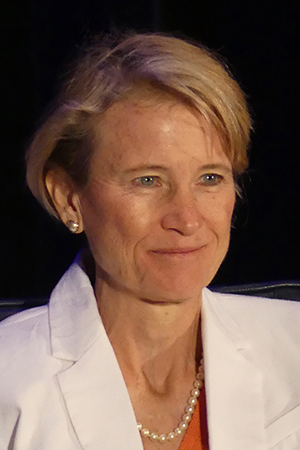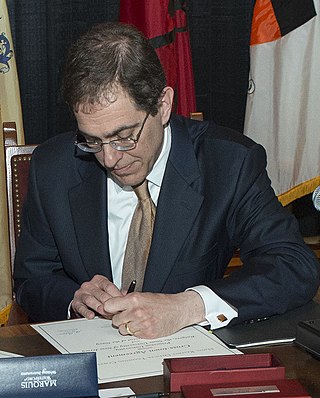
Nadine Strossen is an American legal scholar and civil liberties activist who served as the president of the American Civil Liberties Union (ACLU) from 1991 to 2008. A liberal feminist, she was the first woman to lead the ACLU. A professor at New York Law School, Strossen is a member of the Council on Foreign Relations and other professional organizations.
Herbert J. Storing was an American political scientist with broad ranging interests who is best known for reviving the serious study of the American Founding. The constitutional theorist and American politics scholar Walter Berns called him "the most profound man I have encountered in the field of American studies."

Tara A. Smith is an American philosopher. She is a professor of philosophy, the BB&T Chair for the Study of Objectivism, and the Anthem Foundation Fellow for the Study of Objectivism at the University of Texas at Austin.

Wayne Barrett was an American journalist. He worked as an investigative reporter and senior editor for The Village Voice for 37 years, until he was laid off in 2011.
Daniel Bonevac is an American philosopher born in Pittsburgh. He is professor of philosophy at the University of Texas at Austin. He has degrees in philosophy from Haverford College, and the University of Pittsburgh. His areas of interest are metaphysics, philosophical logic, ethics, and Eastern philosophy. In autumn 2016, Bonevac joined 145 other scholars and writers in declaring support for Donald Trump for president. He has posted hundreds of philosophy videos on his YouTube channel.

Christopher Ludwig Eisgruber is an American academic and legal scholar who is serving as the 20th President of Princeton University, where he is also the Laurance S. Rockefeller Professor of Public Affairs in the Princeton School of Public and International Affairs and the University Center for Human Values. He is also an expert on constitutional law, with an emphasis on law & religion and federal judicial appointments.
The rhetorical presidency is a political communication theory that describes the communication and government style of U.S. presidents in the twentieth century. This theory describes the transition from a presidency that directed rhetoric toward the United States Congress and other government bodies, to one that addresses rhetoric, policy and ideas directly to the public.
American political development is a subfield of political science that studies the historical development of politics in the United States. In American political science departments, it is considered a subfield within American politics and is closely linked to historical institutionalism.
Elizabeth M. "Becky" Pettit is an American sociologist with expertise in demography. She has been a professor of sociology at the University of Texas-Austin, as well as an affiliate at its Population Research Center, since 2014. She is an advocate for decarceration in the United States.
Lora Patricia Romero was an American assistant professor of English at Stanford University. She specialized in 19th and 20th century American literature, Chicano/a cultural studies, and gender theory.
Jack Porter Gibbs was an American sociologist known for his work on social control theory and deterrence. In the early 1960s, he and Leonard Broom helped plan the founding of the Population Research Center at the University of Texas at Austin, which was founded in 1963. A 2015 book described Gibbs as "a giant of his time".
Stephen Sonnenberg, has served as the interim associate chair for education and is professor in the Department of Psychiatry and Behavioral Sciences and a courtesy professor in the department of medical education and the department of population health at UT Austin's Dell Medical School.He is also the Paul Woodruff Professor for Excellence in Undergraduate Studies in the school of undergraduate studies at the University of Texas at Austin.
Bethany Lee Albertson is an American Political psychologist. She is an Associate professor of political science at the University of Texas at Austin. Her co-authored book Anxious Politics: Democratic Citizenship in a Threatening World received the Robert E. Lane Award for being the best book in political psychology published in 2015.
Joseph Curtis "Joe" Salmons is an American linguist who is Professor of Language Sciences at University of Wisconsin – Madison.
Debra J. Umberson is an American sociologist. She is a professor of sociology at the University of Texas at Austin and director of the Population Research Center.

Keith E. Whittington is an American political scientist. He is the William Nelson Cromwell Professor of Politics at Princeton University since 2006. In July 2024, he will join the Yale Law School faculty. Whittington's research focuses on American constitutionalism, American political and constitutional history, judicial politics, the presidency, and free speech and the law.
Patrick L. Cox is an American scholar of Texas history and former journalist.
Mary Myelin Hayhoe is an Australian American psychologist who researches vision. She has developed virtual environments for the investigation of visually guided behaviour. Hayhoe was awarded the 2022 Optica Award Edgar D. Tillyer Award for her contributions to visual perception and cognition.





